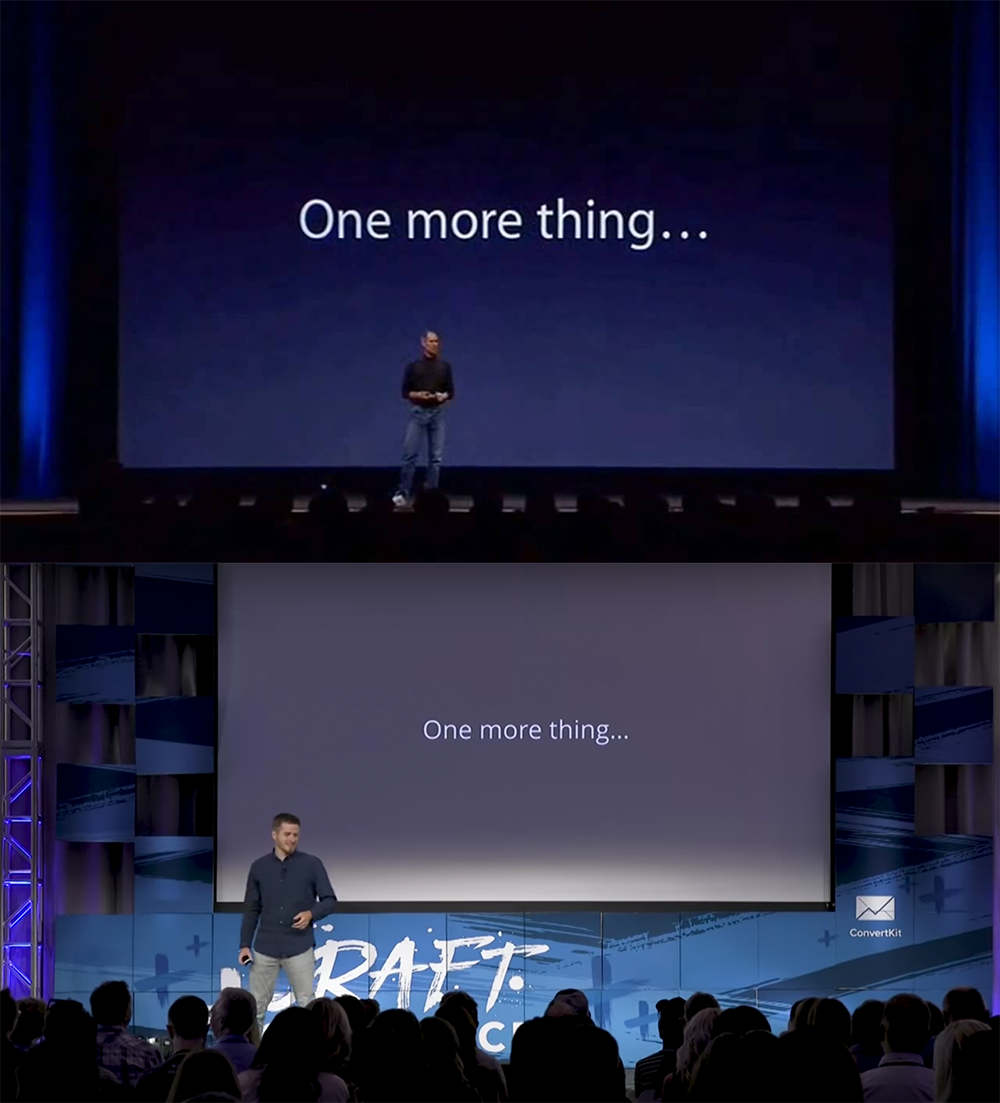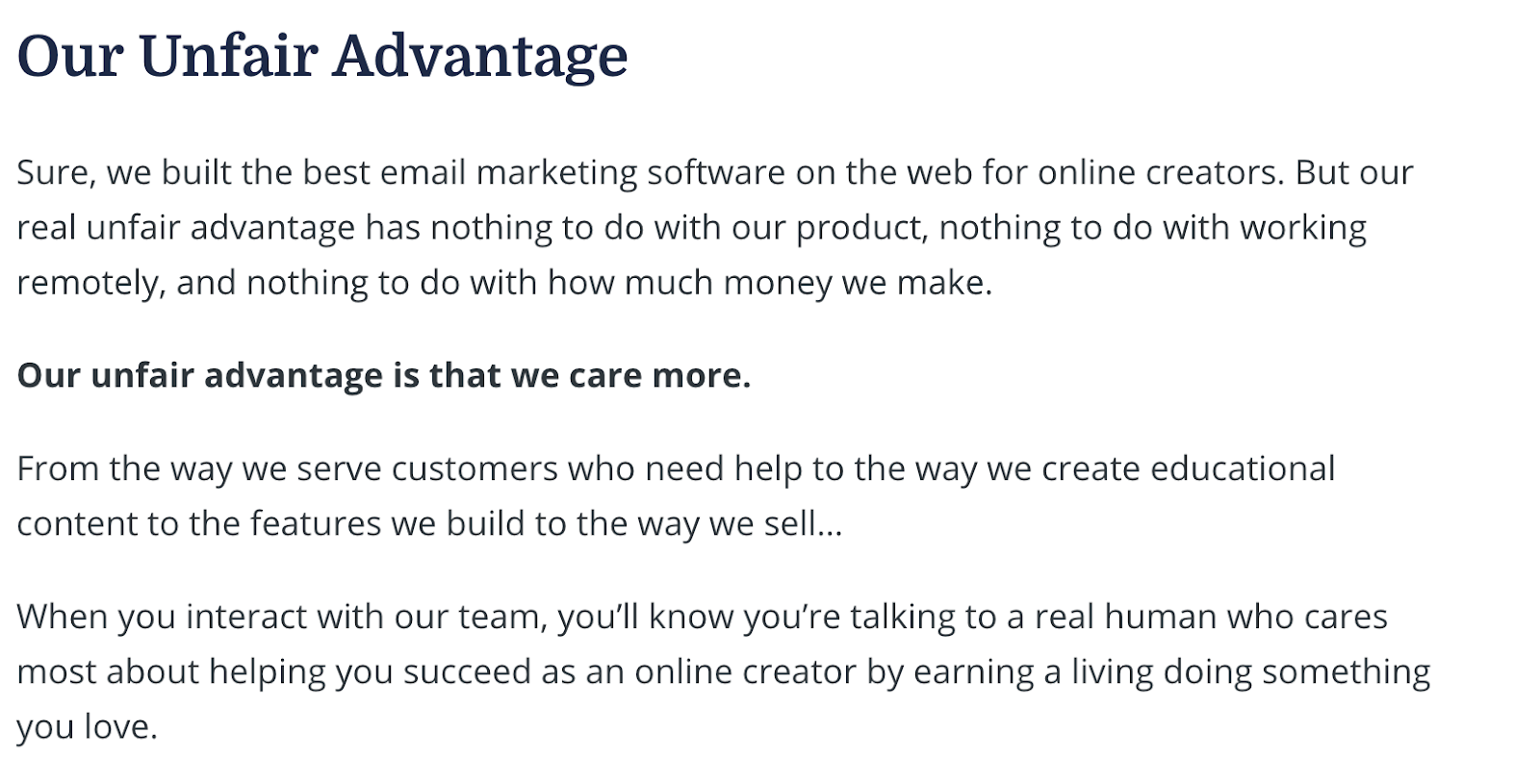
ConvertKit founder Nathan Barry on undoing a rebrand
This summer, Nathan Barry took the stage at his company’s conference brimming with optimism and energy. In an homage to early Apple keynotes, Barry announced to the room full of customers and creators new features for his email service provider to hoots and hollers. And then completing the tribute, he threw up a slide that simply read “one more thing….”

Below: Nathan Barry at Craft and Commerce in July 2018.
ConvertKit had more than $1 million in monthly recurring revenue and 19,000-plus customers. And on that day, it was sliding in one of the last pieces of the puzzle. On July 1, Barry announced, ConvertKit would rebrand to “Seva,” inspired by the Sanskrit word meaning “selfless service” and the Hindi word meaning “service.” It was the capstone of the company’s half-decade-long quest to help online creators.
“ConvertKit doesn’t capture the mission we’re on to serve you. We needed a new name,” read the announcement. “Something that captures how much we care about you and how much you care about serving your audience.”
“We spent the last two years coming up with a new name,” Barry said from the stage. “Seva is the future of how we’re building this company.”
And that’s when the pushback began.
Barry’s announcement from the stage at Commerce and Craft, his company’s conference for online creators
One criticism read:
“This word is not yours to claim. This word is not yours to trademark and turn into some modern slang. Keep it out of your mouths and don’t dirty it by making money off the teachings of my religion.”
Another:
“The word Seva is sacred to a lot of us. It’s pure. It’s literally is the opposite of anything business related. Seva is the opposite of anything related to making money. So it feels a little ‘c’mon man’ to name your business that. I’d say this if the business was run by Americans or Indians or whoever.”
Seva has a unique spiritual meaning in the Sikh religion. It’s a holy concept. One that (as ConvertKit would come to find) is difficult to internalize unless you’ve truly come of age with it in your life.
At first, Barry and his team paused before reacting. Was this the cliché and overblown internet outrage we’ve come to expect online? Or was it a genuine slip up that would undermine his business and the mission of his company?
And even so: was it worth undoing months of planning and a half-million dollars of hard costs?

But then, after a candid and bracing conversation with a selfless Sikh man, ConvertKit reversed its position. Seva is ConvertKit again — but not without a few bumps along the way. In this conversation, we asked Barry about the journey and what’s next for ConvertKit.
This interview was edited for length and clarity, and took place across two separate conversations.
When ConvertKit became Seva, what was the reason for the pushback?
There were a few groups:
One group thought we should have given more heads up. And then there was this cultural appropriation angle. People were saying, “Hey, it’s not your culture. You can’t use this word.”
There weren’t too many people in that camp. And then the last group said, “Hey, this is not just a word from another culture. This is a word that’s sacred to my religion.” Those people didn’t say “I’m angry.” They said “I’m hurt.”
We’re very used to coming across anger on the internet. But for someone to say “I’m hurt”? That stands out. I reached out to every person who said they were hurt to get on a call — it ended up being seven or eight calls. There were people who definitely refused, who had written Medium articles, stuff like that. Maybe they were more angry than hurt. I offered to pay $100 to get on a call with them. They said no.
How’d the calls go?
I got through lots of conversations that changed my perspective, from, “How do we move forward with this word?” to “How do we move forward in the most respectful way possible? How do we make sure that we are not wiping out the meaning of Seva on the internet?”
I was thinking, “Maybe we have a page that points to the different meanings of Seva with links to learn more and link to charities?”
And then at the end of that week … I was on this call with a guy for an hour and a half. And he really explained the meaning of the word, the heritage, and everything else. The word means “selfless service” or “giving without the expectation of getting anything in return.” It’s the purest form of worship and being close to God in Sikhism.
At the end of the call I asked, “Hey, so we’re moving forward with this. We want to do it in the most respectful way possible. Will you help us understand the meaning? As we put out communication, can you read it in advance? I know you won’t be happy about it, but can you help us show the most respect possible?” There was a long pause.
And then he said, “I will. It would be from a place of hurt and grief. Because it’s taking something so meaningful to me and redefining it. Something will be lost from my religion as part of this. But I will. And the reason is that it would be an act of Seva. It would be giving without expectation.”
That really struck me.
Want to build a business that enables you to live YOUR Rich Life? Get my FREE guide on finding your first profitable idea.
Want to build a business that enables you to live YOUR Rich Life? Get my FREE guide on finding your first profitable idea.
Throughout this week, I was trying to understand beyond the dictionary. Trying to truly understand what a powerful word and concept this is. And in that moment, I realized that if we understand even a little bit of what Seva means, the truest way to live that out is to move forward without it.

If you go to our mission page, we believe what sets us apart is caring more. I loved the word Seva because I felt it represented our mission so clearly. And every decision we make as a company should be based on living out that mission.
And the truest way to live out our mission and Seva is to not use it. It was a weird place. I was so excited about the name and then learning the true way to live it out was to not move forward.
Then it was clear: I realized if I understood even a hundredth of what this word means, we can’t move forward. We don’t gain anything by giving it back. We actually lose a half-million dollars in the process. There’s a whole vision for the company that we had planned that we need to reconsider, and I’m not sure what happens with all of that.
Wait. Do you mean you paid someone $500,000 to do the branding? Or that the future product launches of the company were scrapped or changed because of this?
Both. We have spent that amount in hard costs, mostly on the domain. But also there’s a lot of plans that centered around the new name I can’t get into.
I’ll admit, part of me would think, “I’m not letting 25 people tell me what to do!” But it’s more about deviating from the mission inadvertently, yeah?
Exactly. That’s the point going forward and the biggest takeaway: You’re going to find yourself in these situations where you have hard choices. And if you have those mission and values written out in advance, follow those. Put the decision through the lens of the mission and values. For us, it went from being this complicated decision with nuance and stakeholders to being simple. This was the truest way to live our values.
Did you have people coming to you saying “do not change your name”?
We haven’t publicly explained that this is about more than [the people expressing outrage]. We will explain this over time. I don’t want to send mixed messages. So maybe this interview and some other things I’ll write moving forward will tell the full story. I actually had a lot of this in our initial letter but we cut it out.
Do you feel the need to explain? Shouldn’t it be “all is well that ends well”?
There’s that mission thing again. One of our values is to “teach everything you know.” It’s actually on the shirt I’m wearing right this moment. We’re not the first or last business to find themselves in this kind of situation. And if we keep this to ourselves we’re not living our values.
A lot of people will view mission and values as esoteric things that don’t make money. But this framework probably saved you a lot of money and headaches in the long run, because there was no obvious right call here.
Right. Having a clearly stated mission and values gave me peace in making the decision. I have several 3,000- to 4,000-word pieces about the rebranding process. They all end with “We’re now Seva!” So, needless to say, I’ve been working on a different version.
What are you going to do with the domain name?
I don’t know. There are other organizations that might want it. We could sell it. We are a business, after all. We might donate it. Or we might keep it for our non-profit work. But the best thing we can do is just sit with it. There’s actually a Y-combinator startup named Seva.
Oh man. Good luck, guys.
They’ll be fine. One of the founders is actually Hindi.
Should that matter?
They understand the meaning of the word. It’s their culture. Seva is interesting because it is so common. In Hindi, it means “service.” In Sikhism, it means “selflessness.” We like the Sikh definition. It may have been slightly different if we had chosen the Hindi version.
You think the version you chose matters more than the cultural background of the people who chose it?
It’s both. They can say, “I truly understand what this means.” We can only say, “We’ve done our best to learn what this means.” And people say, “You don’t.” And we can’t say it’s come from a language we’ve spoken and a culture we’ve grown up in. We can’t.
I did get emails from Hindus telling me it’s a common word. One email said, “The app on my phone to get my passport in India is called ‘Passport Seva,’” meaning “the passport service.” Someone that comes from that culture could know that and do what we did. We can’t.
Jeff Bezos once said that it’s a competitive advantage to be willing to stretch out your time frame to the long term. That’s what this focus on ConvertKit’s mission feels like to me.
One thing that’s been a great mindset shift for me on that is this last summer, my wife and I moved from a house in downtown Boise to one farther out. So we have this giant field in the back, right? It’s like three acres, just this big open field, nothing in it.
Last fall we planted like 15 trees in it, so we got some progress. And I thought, “Next year I’ll plant 15 more.” Well then this spring comes, and I’m looking at those trees and they’re already taller, more established … and I’m like, “Instead of staggering it, I wish I’d planted them all at once with the first group. Then I would have had that extra six months for them to grow.”
So more and more I’m thinking about businesses in that way. What things am I willing to just put work into and maintain because I know what it’s gonna look like in 20 years? Everybody’s trying to flip their startups and everybody’s trying to get that exit.
That’s the beauty of being heads down and focused. It’s like taking advantage of compound interest.
That’s why I really admire someone like author Ryan Holiday. And not just because he has a farm [laughs]. He’s a relentless creator and he’s chosen his craft of writing. And he just makes things at a rate that no one else does.
I think an important sentence that everyone should complete for themselves at many different stages of life is “I am the kind of person who ….” Fill in that blank.
I think it’s a useful phrase because you can assign things into it and try it on. If you’re honest with yourself, you can swap things into that blank and ask “Am I willing to work that much for it?”
What’s one controversial or unorthodox opinion you have about business?
I have this belief that anyone could be a Tim Ferriss or a Gary Vaynerchuk (or whoever is at the top of your field). But to be that you need to take the idea that you need to show up every day for 2 years and change that to showing up every day for 20 years.
You need a little bit of a healthy dose of James Clear’s “one percent better” too. Combine that with a long time frame and I think you can do it. Anyone can do it. I don’t think successful people have this magical ability. I’m friends with lots of these people. I watch them procrastinate and do all the negative things you and I do.
It’s popular to talk about luck and to believe, “Oh I didn’t actually do this, I was lucky.” I don’t quite know how to phrase my thoughts on this but I don’t think that’s the healthy way to think.
It’s also fake self-effacing. I don’t think any successful person actually believes what happens to them is all luck. We all have a few breaks in our life that could have changed our path. But the main ingredient has to be one’s own agency.
Yes. It’s a harmful opinion. It takes away your agency. Whereas if you show up for 20 years, the chances of you getting lucky are infinitely higher than if you sit around waiting to get lucky reading blog posts by other lucky people.



